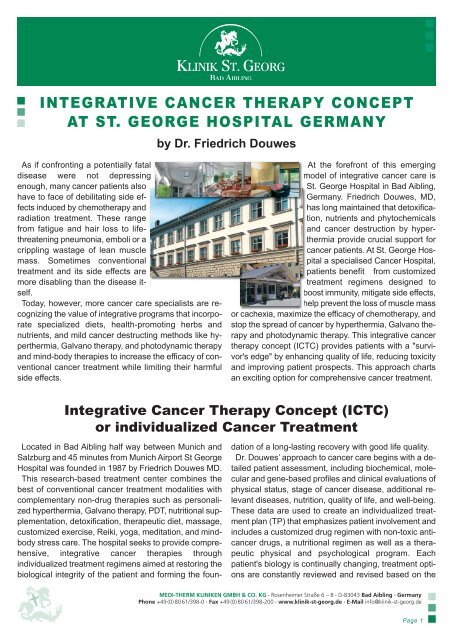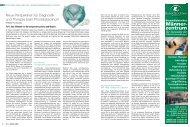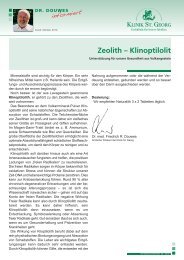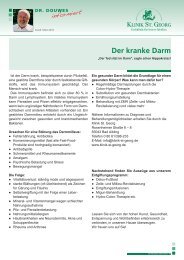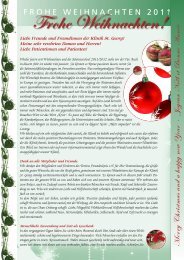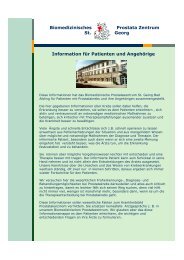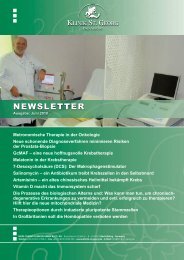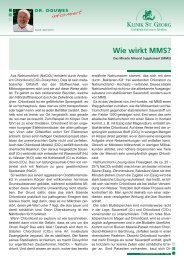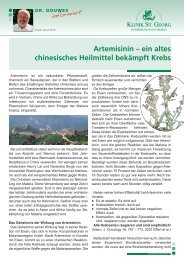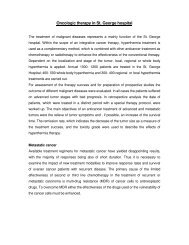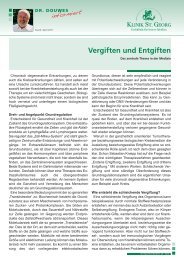InTegraTIve CanCer Therapy ConCepT aT ST ... - Klinik St. Georg
InTegraTIve CanCer Therapy ConCepT aT ST ... - Klinik St. Georg
InTegraTIve CanCer Therapy ConCepT aT ST ... - Klinik St. Georg
Create successful ePaper yourself
Turn your PDF publications into a flip-book with our unique Google optimized e-Paper software.
<strong>InTegr<strong>aT</strong>Ive</strong> <strong>CanCer</strong> <strong>Therapy</strong> <strong>ConCepT</strong><br />
<strong>aT</strong> <strong>ST</strong>. george hoSpITal germany<br />
As if confronting a potentially fatal<br />
disease were not depressing<br />
enough, many cancer patients also<br />
have to face of debilitating side effects<br />
induced by chemotherapy and<br />
radiation treatment. These range<br />
from fatigue and hair loss to lifethreatening<br />
pneumonia, emboli or a<br />
crippling wastage of lean muscle<br />
mass. Sometimes conventional<br />
treatment and its side effects are<br />
more disabling than the disease itself.<br />
Today, however, more cancer care specialists are recognizing<br />
the value of integrative programs that incorporate<br />
specialized diets, health-promoting herbs and<br />
nutrients, and mild cancer destructing methods like hyperthermia,<br />
Galvano therapy, and photodynamic therapy<br />
and mind-body therapies to increase the efficacy of conventional<br />
cancer treatment while limiting their harmful<br />
side effects.<br />
by Dr. Friedrich Douwes<br />
At the forefront of this emerging<br />
model of integrative cancer care is<br />
<strong>St</strong>. <strong>Georg</strong>e Hospital in Bad Aibling,<br />
Germany. Friedrich Douwes, MD,<br />
has long maintained that detoxification,<br />
nutrients and phytochemicals<br />
and cancer destruction by hyperthermia<br />
provide crucial support for<br />
cancer patients. At <strong>St</strong>. <strong>Georg</strong>e Hospital<br />
a specialised Cancer Hospital,<br />
patients benefit from customized<br />
treatment regimens designed to<br />
boost immunity, mitigate side effects,<br />
help prevent the loss of muscle mass<br />
or cachexia, maximize the efficacy of chemotherapy, and<br />
stop the spread of cancer by hyperthermia, Galvano therapy<br />
and photodynamic therapy. This integrative cancer<br />
therapy concept (ICTC) provides patients with a "survivor's<br />
edge" by enhancing quality of life, reducing toxicity<br />
and improving patient prospects. This approach charts<br />
an exciting option for comprehensive cancer treatment.<br />
Integrative Cancer <strong>Therapy</strong> Concept (ICTC)<br />
or individualized Cancer Treatment<br />
Located in Bad Aibling half way between Munich and<br />
Salzburg and 45 minutes from Munich Airport <strong>St</strong> <strong>Georg</strong>e<br />
Hospital was founded in 1987 by Friedrich Douwes MD.<br />
This research-based treatment center combines the<br />
best of conventional cancer treatment modalities with<br />
complementary non-drug therapies such as personalized<br />
hyperthermia, Galvano therapy, PDT, nutritional supplementation,<br />
detoxification, therapeutic diet, massage,<br />
customized exercise, Reiki, yoga, meditation, and mindbody<br />
stress care. The hospital seeks to provide comprehensive,<br />
integrative cancer therapies through<br />
individualized treatment regimens aimed at restoring the<br />
biological integrity of the patient and forming the foun-<br />
dation of a long-lasting recovery with good life quality.<br />
Dr. Douwes’ approach to cancer care begins with a detailed<br />
patient assessment, including biochemical, molecular<br />
and gene-based profiles and clinical evaluations of<br />
physical status, stage of cancer disease, additional relevant<br />
diseases, nutrition, quality of life, and well-being.<br />
These data are used to create an individualized treatment<br />
plan (TP) that emphasizes patient involvement and<br />
includes a customized drug regimen with non-toxic anticancer<br />
drugs, a nutritional regimen as well as a therapeutic<br />
physical and psychological program. Each<br />
patient's biology is continually changing, treatment options<br />
are constantly reviewed and revised based on the<br />
MEDI-THERM KLINIKEN GMBH & CO. KG · Rosenheimer <strong>St</strong>raße 6 – 8 · D-83043 Bad Aibling · Germany<br />
Phone +49 (0)8061/398-0 · Fax +49 (0)8061/398-200 · www.klinik-st-georg.de · E-Mail info@klinik-st-georg.de<br />
Page 1
<strong>InTegr<strong>aT</strong>Ive</strong> <strong>CanCer</strong> <strong>Therapy</strong> <strong>ConCepT</strong><br />
<strong>aT</strong> <strong>ST</strong>. george hoSpITal germany<br />
most current diagnostic and medical data. This means<br />
that every component of treatment is individualized to<br />
match a patient's unique needs.<br />
<strong>St</strong>. <strong>Georg</strong>e provides detailed information for each patient,<br />
including a clear understanding of their comprehensive<br />
clinical treatment plan. It's not enough to simply<br />
prescribe - patients themselves need to be trained and<br />
equipped to carry out a therapeutic regimen. Patients are<br />
trained to be active participants in their care - therefore<br />
it is very important that they have a deep understanding<br />
of the ICTC.<br />
According to Friedrich Douwes, MD they never would<br />
start chemotherapy with a patient who is not fit enough<br />
to withstand and benefit from the treatment. He finds it<br />
unfair to the patient because conventional cancer treatment<br />
itself has brought him into catabolic situation with<br />
a high level of toxins in his system, paralysed the immune<br />
system, induced physical weakness and depression,<br />
fear etc. So cancer patients must be detoxified,<br />
physically, psychologically, and nutritionally strengthened<br />
to be able to take it on. The stronger the carrier of a cancer,<br />
the easier it is for him to carry the disease. The wea-<br />
ker the carrier is, the easier it is for a cancer to grow.<br />
Therefore it is essential to restore the healthy part of the<br />
patient immediately.<br />
This ICTC of <strong>St</strong>. <strong>Georg</strong>e Hospital is specifically tailored<br />
to each patient and is monitored throughout treatment,<br />
is regularly modified according to the patient's changing<br />
condition, and continues until full recovery. Patients on<br />
conventional chemotherapy often suffer from post-treatment<br />
symptoms such as fatigue, "chemo brain"<br />
(changes in memory and attention following chemotherapy),<br />
physical weakness, and depression. The ICTC of<br />
<strong>St</strong>. <strong>Georg</strong>e Hospital enables patients to better tolerate<br />
chemotherapy, with higher response rates and less side<br />
effects and better life quality. It is a fact that conventional<br />
treatments lead to a burden of toxic metabolites entering<br />
the blood. These complexes trigger inflammatory cascades<br />
resulting in increased mutation and thus more aggressive<br />
cancer cells. This can establish a greater<br />
potential for progression and recurrence. Detoxification<br />
strategies are a critical aspect of eliminating these metabolites<br />
and other aggressive substances like free radicals,<br />
poisons etc. from the patient’s system.<br />
hyperthermia and Insulin potentiation (IpT)<br />
are maximizing the efficacy of Chemotherapy<br />
When chemotherapy is required, doctors at <strong>St</strong>. <strong>Georg</strong>e<br />
Hospital use a unique method of drug delivery called<br />
“low dose insulin potentiated chemotherapy”. This application<br />
of chemotherapy concentrates chemotherapy in<br />
the cancer tissue, is much higher and more selective,<br />
and a good preparation for the following<br />
chemotherapy. That means<br />
with the combination of different<br />
modalities at the same time we<br />
have the highest cancer destruction<br />
response possible.<br />
<strong>St</strong>. <strong>Georg</strong>e Hospital is the first<br />
cancer clinic which uses this<br />
enormous effective treatment concept.<br />
Unlike conventionally infused<br />
chemotherapy, this insulin potentiated therapy<br />
provides the drug, when the cells have opened<br />
ports to let the drug in and have turned off pumps to<br />
bring them out. The synchronic initiated hyperthermia in-<br />
creases initially the blood flow to the cancer tissue and<br />
shuts the blood flow off at a temperature above 41.0°.<br />
This combination helps to concentrate the cytostatics inside<br />
the cancer tissue compared to conventional chemotherapy;<br />
and this with much less amount. Once the<br />
cytostatics are inside the cancer cell the<br />
temperature is increased to 41 –<br />
42°C over a period of one to two<br />
hours. This coordination of insulin<br />
potentiation and hyperthermia<br />
creates a better "killing rate"<br />
for the cancer, with less<br />
toxicity to healthy<br />
cells. Patientstolerate<br />
this<br />
approach<br />
m u c h<br />
b e t t e r<br />
Page 2
<strong>InTegr<strong>aT</strong>Ive</strong> <strong>CanCer</strong> <strong>Therapy</strong> <strong>ConCepT</strong><br />
<strong>aT</strong> <strong>ST</strong>. george hoSpITal germany<br />
than the conventional one and have higher response<br />
and fewer side effects.<br />
Patients who undergo this advanced chemotherapy<br />
treatment in the context of a full integrative cancer therapy<br />
concept (ICTC) have not only less side effects, they<br />
tolerate the therapy with only mild or negligible side effects.<br />
This is highly significant, since as many as one<br />
third of all cancer patients abandon chemotherapy be-<br />
fore its completion due to their inability to tolerate its physical<br />
side effects and the associated psychological<br />
stress.<br />
In fact our own published research confirms that ICTC<br />
is associated with improved outcomes, including reduced<br />
toxicity and improved survival. A review of patients<br />
with metastatic drug resistant ovarian cancer showed an<br />
extended survival time with ICTC of over 70% .<br />
Integrative Cancer <strong>Therapy</strong> Concept (ICTC) – Coordination<br />
of drug treatment with a different biology of Cancer<br />
Conventional cancer therapy like chemotherapy and radiation<br />
cause many disabling side effects, ranging from<br />
fatigue and nausea to muscle wasting.<br />
The ICTC uses lifestyle modification, nutrition and supplementation,<br />
therapeutic movement, and mind-body interventions<br />
to maximize the efficacy and minimize the<br />
side effects of the specific treatment. As growing evidence<br />
supports the validity of this integrative approach,<br />
more oncologists develop an interest and understanding<br />
of this treatment strategy, because of the visible success.<br />
<strong>St</strong>. george hospital is one of germany’s leaders<br />
in comprehensive cancer treatment,<br />
combining conventional oncology modalities<br />
with complementary strategies to help their<br />
patients successfully conquer cancer and<br />
achieve lifelong wellness.<br />
Combining insulin potentiated chemotherapy with local<br />
or systemic hyperthermia is a novel approach that coordinates<br />
drug treatment with the different biology of cancer<br />
cells to normal cells. We administer chemotherapy<br />
at certain times, especially when the blood flow to the<br />
tumor tissue is enhanced by heat application and the cell<br />
ports are open for the chemicals caused by insulin. This<br />
combination produces greater therapeutic effects with<br />
lower toxicity.<br />
Dr. Douwes has developed this ICTC including a health<br />
program to address the broad needs of cancer patients.<br />
The first component includes lifestyle, fitness, mind-spirit,<br />
and a solid nutritional support. The hyperthermia with<br />
IPT targets the cancer tissue but supports the biochemical<br />
micro environment the cancer cells reside in. This is<br />
very important, since from this tissue the immune response<br />
is organized. With ICTC the cancer cells die within<br />
the organ; that means the tumor antigens are<br />
presented to the invading immune cell like macrophages<br />
or dendritic cells and are recognized, so that active specific<br />
immunity may be induced. To support this permanent<br />
detoxification and nutritional support are necessary.<br />
This form of ICTC has enabled patients, who were unable<br />
to tolerate conventional chemotherapy, to use the<br />
same chemotherapy drug they previously stopped and<br />
to complete treatment successfully. ICTC has also benefited<br />
patients whose cancers were previously inoperable,<br />
by reducing the size of their tumors to a size that<br />
makes surgery possible.<br />
establishing optimal health through<br />
nutrition and natural products<br />
Dr. Douwes believes that it is as critical to establish optimal<br />
health through integrative and nutritional interventions,<br />
especially in treating advanced cancer, as it is to<br />
eradicate the disease itself.<br />
He focuses on developing a path to recovery through a<br />
comprehensive and integrative program of treatment<br />
and care. He views illness not as fate or punishment, but<br />
more as a demand to the patient to turn around and<br />
Page 3
<strong>InTegr<strong>aT</strong>Ive</strong> <strong>CanCer</strong> <strong>Therapy</strong> <strong>ConCepT</strong><br />
<strong>aT</strong> <strong>ST</strong>. george hoSpITal germany<br />
change lifestyle. Disease is to his mind uproar of the<br />
body that it cannot proceed the way it has so far and that<br />
it is a demand of the body to change completely, it is a<br />
wake-up call for reclaiming health and transforming life.<br />
For over two decades, Dr. Douwes and his medical<br />
team have been investigating the effect of nutritional interventions<br />
on various cancers among different patient<br />
populations. These findings have been incorporated<br />
in <strong>St</strong>. <strong>Georg</strong>e Hospital’s nutritional program,<br />
which emphasizes nutrients such as<br />
fish oil rich in EPA (eicosapentaenoic acid),<br />
Quercetin, Indol-3-Carbinol respectively<br />
DIM (diindolylmethane, an indole found in<br />
cruciferous vegetables such as broccoli and<br />
cauliflower), EGCG (epigallocatechin gal-late,<br />
the principal polyphenol in green tea), selenium,<br />
zinc, silymarin (a flavonoid in milk thistle), and mistletoe<br />
extracts.<br />
In addressing difficult-to-treat oncology issues, particularly<br />
for patients with advanced cancer, Dr. Douwes<br />
adopts more aggressive medical strategies for cancer<br />
management. Besides improving stamina and vitality,<br />
the program of <strong>St</strong>. <strong>Georg</strong>e Hospital targets in the first<br />
line to destruct the main cancer mass by local hyperthermia.<br />
Hyperthermia has an oncolytic effect, inhibits proliferation,<br />
and produces heat shock proteins mainly in<br />
cancer cells, which make them recognizable for natural<br />
killer cells. That means it boosts not only the immune<br />
system, it also induces a specific anti cancer immunity.<br />
Hyperthermia has a lot more interesting mechanism to<br />
destroy cancer, especially if one uses electro hyperthermia<br />
or oncothermia as we use it. This type of hyperthermia<br />
is very different from microwave hyperthermia, which<br />
has only a limited use. Oncothermia is self focussing and<br />
has much deeper penetration and can therefore also be<br />
used for liver, lung and brain metastases. (More information<br />
about hyperthermia and how it works see in a<br />
specific chapter on this website). During this phase of<br />
cancer destruction the patient has a daily detoxification<br />
program and a diet rich in antioxidants and whole plantbased<br />
supplements that reflect the full spectrum of nutrients<br />
found in good and healthy food. Combinations of<br />
antioxidants with good food have more potent anti cancer<br />
effects than individual nutrients.<br />
The diet at <strong>St</strong>. <strong>Georg</strong>e contains no sugar, is low in saturated<br />
fats, is high in fibers, complex carbohydrates,<br />
fruits, cruciferous vegetables, omega-3 fatty acids, and<br />
plant-based sources of protein. This nutritional strategy<br />
targets the patient's internal terrain, creating an environment<br />
inhospitable to further disease. This is intended to<br />
help curtail inflammation, reduce free-radical damage,<br />
minimize platelet activation (which can lead to dangerous<br />
blood clotting), manage blood sugar surges, and reduce<br />
serum levels of insulin-like growth factor 1, or IGF-1<br />
which stimulates cell multiplication and inhibits cell<br />
death.<br />
Integrated into the ICTC is a nutrition plan<br />
with micronutrients, macronutrients, and<br />
phyto-chemicals that better and quicker improve<br />
general resistance. For many cancer<br />
patients, these may include vitamin B12, selenium,<br />
zinc, folic acid, vitamin C, vitamin D3,<br />
gamma tocopherol, tocotrienols, vitamin K2, calcium,<br />
magnesium, chromium, lycopene, and boswellia.<br />
Special infusion programs are developed to increase the<br />
body's resistance to stress, to overcome fatigue and malaise<br />
induced by chemotherapy and radiation, and improve<br />
vitality.<br />
Unlike conventional cancer management, the ICTC targets<br />
one of the most serious consequences of the<br />
disease, known as cancer cachexia. This is a type of<br />
malnutrition associated with appetite suppression, muscle<br />
wasting, weight loss, and weakness, 20-30% of cancer<br />
patients actually die from complications of<br />
malnutrition, rather than from cancer itself. Malnutrion<br />
often is induced by conventional treatment and not corrected.<br />
And as long as a patient is in a catabolic situation<br />
he has no chance to win the battle.<br />
Diets that are high in EPA and proteins (Budwig diet)<br />
help cancer patients suffering from cachexia to gain<br />
weight and improve their nutritional status. The oil-protein<br />
diet also opposes cancer cachexia through its antiinflammatory<br />
effects and its ability to displace<br />
arachidonic acid, a pro-inflammatory omega-6 fatty acid,<br />
from cell membranes. Reducing intake of foods containing<br />
arachidonic acid, such as red meat, egg yolks, poultry,<br />
and dairy products, also helps shift the body's<br />
biochemistry away from a pro-inflammatory environment.<br />
A high intake of L-carnitine, L-glutamine, alpha lipoic<br />
acid and coenzyme Q 10 can likewise have a<br />
beneficial muscle-sparing effect and can help to prevent<br />
cancer cachexia.<br />
Targeting the disease and its micro environment is a<br />
modern goal. Several target substances entered the<br />
Page 4
<strong>InTegr<strong>aT</strong>Ive</strong> <strong>CanCer</strong> <strong>Therapy</strong> <strong>ConCepT</strong><br />
<strong>aT</strong> <strong>ST</strong>. george hoSpITal germany<br />
market lately and have promising clinical effects. One of<br />
these targets is the blockage of tumor angiogenesis (the<br />
growth of blood vessels that feed tumors). Blocking the<br />
formation of vessels is slowing down cancer growth, facilitating<br />
apoptosis - the programmed cancer cell death,<br />
and preventing tumor metastases respectively cancer<br />
spread throughout the body. We could show almost ten<br />
years ago, that hyperthermia has also a marked anti-angiogenetic<br />
effect. The tumor vessels are not as well built<br />
as normal capillaries; they are less organized and cannot<br />
constrict and relax as normal capillaries. In the early<br />
phase of hyperthermia, when the temperature in tumor<br />
tissue is rising, the vessels relax to increase the blood<br />
flow to the tumor tissue, but as soon as the temperature<br />
goes higher then 40°C the constriction of the blood flow<br />
stops, it comes to formation of micro thrombi causing hypoxemia<br />
in the cancer tissue, which together with other<br />
important mechanisms induce apoptosis and cancer cell<br />
death. So hyperthermia is an elegant form of anti-angiogenesis.<br />
Important is also to evaluate some other biomarkers including<br />
a unique set of biochemical tests that include inflammation,<br />
coagulation, and oxidative stress, immune<br />
and hormone profile. These data are important to use<br />
the right phyto chemicals and nutrients. Especially phyto<br />
medicines have multiple potential uses – they are pleiotrophs<br />
– and produce many effects that enable them to<br />
hit more than one target at a time.<br />
• Milk thistle is mostly known for its protective<br />
effects against chemical toxicity,<br />
but it can also prevent the loss of<br />
glutathione, which is fairly common in<br />
cancer patients.<br />
• Ginger has detoxification potential as<br />
well as significant anti-inflammatory effects.<br />
It inhibits both the cyclooxygenase and lipoxygenase<br />
inflamma tory pathways, and is<br />
very effective in reducing nausea and vomiting.<br />
• Lipoic acid may counter neuropathy, a risk for patients<br />
using the chemotherapy drug platinum or paclitaxel,<br />
but also helps to support mitochondria<br />
• Coenzyme Q10 is recommended for patients using<br />
the chemotherapy drugs doxorubicin (Adriamycin ® ,<br />
Doxil*) and trastuzumab (Herceptin ® ), to counteract<br />
the risk of cardiomyopathy.<br />
• Protein and amino acid support formulas have been<br />
helpful in reducing muscle loss, and in maintaining<br />
immune and biological functioning. Other supplements<br />
as used at <strong>St</strong> <strong>Georg</strong>e Hospital to enhance cancer<br />
treatment are: L-Carnitine and Glutamine. When<br />
used in conjunction with chemotherapy, they may reduce<br />
some side effects of treatment, including mouth<br />
sores, neuropathy, and diarrhoea. In addition, glutamine<br />
may increase tumor sensitivity to chemotherapy.<br />
• Fish oil and flaxseed oil may play an important role in<br />
cancer treatment through its ability to help suppress<br />
inflammation. Additionally, omega-3 fatty acids help<br />
reduce the resistance that cancer cells often develop<br />
to cytostatic agents. Some studies have shown that<br />
breast cancer patients who respond favorably to chemotherapy<br />
have higher levels of omega-3s than<br />
those who do not respond.<br />
• Green tea is a potent antioxidant and anti-inflammatory<br />
agent. Green tea consumption has been associated<br />
with a reduced occurrence of early-stage breast<br />
cancer and a diminished risk of lymph node metastases.<br />
EGCG from green tea has anti-metastatic properties<br />
that may block the spread of tumors. <strong>St</strong>udies<br />
suggest that EGCG may work in part by blocking the<br />
activity of matrix met-alloproteinase enzymes. When<br />
over-expressed, these enzymes promote<br />
tumor angiogenesis and metastasis.<br />
Green tea may also help tumors to build<br />
up their own tumor vessels, they have an<br />
anti-angiogenetic effect. To drink at least<br />
three to five cups a day is therefore a<br />
good suggestion.<br />
• Mistletoe extracts improve life quality, the immune<br />
response and prolong the survival time of<br />
cancer patient<br />
• Modified citrus pectin fights cancer by inhibiting primary<br />
tumor growth and suppressing cancer metastases.<br />
Modified citrus pectin is indicated for men with<br />
prostate cancer. Rising levels of PSA have been used<br />
to measure disease progression. Administering modified<br />
citrus pectin to these men increases their PSA<br />
doubling time, indicating a slowing down of disease<br />
progression.<br />
Page 5
<strong>InTegr<strong>aT</strong>Ive</strong> <strong>CanCer</strong> <strong>Therapy</strong> <strong>ConCepT</strong><br />
<strong>aT</strong> <strong>ST</strong>. george hoSpITal germany<br />
Conclusion<br />
Improving Quality of life by (ICTC)<br />
Conventional cancer treatment often damages the immune<br />
system and has a long lasting immune depressive<br />
activity and makes these patients vulnerable to infections.<br />
Thus, we must boost the body's immune defences<br />
and surveillance.<br />
Natural killer cells in the immune system are crucial to<br />
effective immune defence. Hyperthermia releases a<br />
bunch of zytokines and heat shock proteins which make<br />
cancer cells more immunogenic that means they are better<br />
recognized by the natural killer cells. NK cells are essential<br />
in killing virus-infected cells and destroying<br />
cancer cells. The nutrients selenium, ß-glycan and zinc<br />
increase circulating levels of natural killer cells and boost<br />
their cancer-killing activity.<br />
<strong>St</strong>. <strong>Georg</strong>e Hospital seeks to strengthen a cancer patient's<br />
health before, during, and after cancer therapy.<br />
Implementing a comprehensive, individualized program<br />
1. Med Hypotheses. 2003 Jul; 61 (l): l-15.<br />
2. Integr Cancer Ther. 2005 Dec; 4 (4): 301-14.<br />
3. Dev Cell 2006 May; 10 (5): 539-40.<br />
4. Yakugaku Zasshi. 2006 Jun; 126 (6): 415-22.<br />
5. Chronobiollnt. 2002 Jan; 19 (l): l-19.<br />
6. Pathol Biol (Paris). 1996 Sep; 44 (7): 631-44.<br />
7. Chronobiol Int. 2002 Jan; 19 (l): 237-51.<br />
8. Free Radic Biol Med. 1995 May; 18 (5): 949-53.<br />
9. Free Radic Res. 1995 Feb; 22 (2): 177-86.<br />
10. Nutr Cancer. 1996; 26 (1): 11-9.<br />
11. EwJOncolNurs. 2005; 9 (Suppl 2): S39-50.<br />
12. Lipids. 2003 Apr; 38 (4): 343-52.<br />
13. JPEN J Parenter Enteral Nutr. 2000 May;<br />
24 (3): 133-9.<br />
14. Clin Nutr. 2005 Jun; 24 (3): 442-54.<br />
references<br />
For more information...<br />
that includes dietary and nutritional support, hyperthermia,<br />
non-toxic anti cancer drugs can help cancer patients<br />
minimize the complications of their disease and<br />
the side effects associated with conventional cancer<br />
treatment. Because patients often feel abandoned following<br />
the completion of chemotherapy, the ICTC continues<br />
even after a patient returns home. The goal is<br />
secondary prevention.<br />
ICTC as it is practised at <strong>St</strong>. <strong>Georg</strong>e Hospital is a comprehensive<br />
approach of fighting cancer and its complications.<br />
<strong>St</strong>. <strong>Georg</strong>e Hospital has 20 years experience<br />
with its integrative cancer therapy concept (ICTC). Important<br />
is the combination of conventional cancer therapies<br />
with a variety of complementary methods especially<br />
hyperthermia, Galvano and PDT.<br />
15. Nutrition. 2001 Sep; 17 (9): 766-8.<br />
16. J Natl Cancer Inst. 2002 Dec 18;<br />
94 (24): 1854-62.<br />
17. Altern Med Rev. 2000 Dec; 5(6): 573-5.<br />
18. Prostate Cancer Prostatic Dis. 2003; 6 (4): 301-4.<br />
19. Biochim Biophys Acta. 2000 Mar 16;<br />
1478(1): 51-60.<br />
20. Cancer. 2001 Feb 15; 91 (4): 822-32.<br />
21. MolCarcinog. 2004 Jul; 40 (3): 143-9.<br />
22. J Cancer Res Clin Oncol. 1988; 114 (5): 507-8.<br />
23. Biol Trace Elem Res. 1994 Apr; 41 (l-2): 115-27.<br />
24. Integr Med. 2000 Mar 21; 2 (2): 85-92.<br />
25. Am J Clin Nutr. 1996 Nov; 64 (5): 772-7.<br />
26. J Lab Clin Med. 1985 Jan; 105 (1): 19-22.<br />
27. MolCellBiochem. 1998 Nov; 188 (l-2): 63-9.<br />
Please visit www.klinik-st-georg.com · Phone +49 (0) 80 61/398-233 · info@klinik-st-georg.com<br />
MEDI-THERM KLINIKEN GMBH & CO. KG · Rosenheimer <strong>St</strong>raße 6 – 8 · D-83043 Bad Aibling · Germany<br />
Phone +49 (0)8061/398-0 · Fax +49 (0)8061/398-200 · www.klinik-st-georg.de · E-Mail info@klinik-st-georg.de<br />
Page 6


